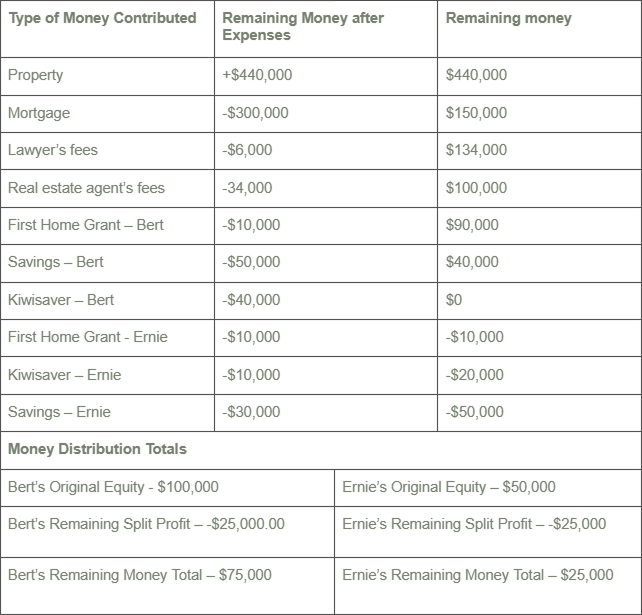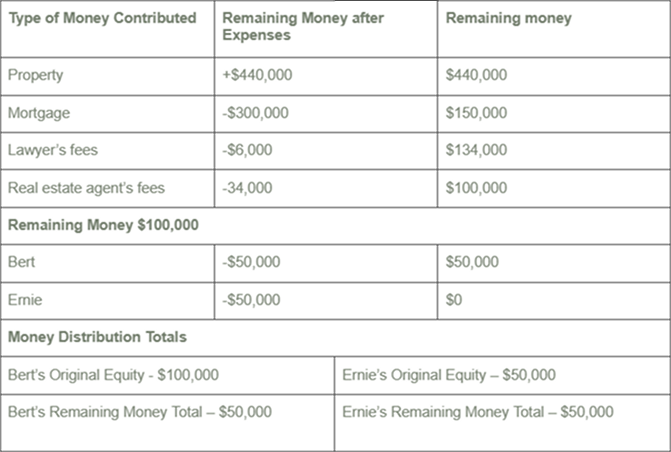.webp)

The purpose of this blog is to explore what monetary options are available to you as a couple if you are buying a house together. It does not take into account marriage, kids, trusts, or complex relationship property agreements.
The examples below merely show alternative ways of thinking and what you could put into a Contracting Out Agreement.
We recommend using Agreeable. If you require a legal document to record how your money has been spent to acquire this property, it may be worth looking into using Agreeable. Agreeable provides a cost-effective solution for couples who are buying property together.
Ernie and Bert have been together for 10 years. They bought a newbuild property together for $600,000. For all of these examples, this property is Ernie and Bert’s main home. Ernie and Bert bought the property with a $150,000 deposit and a $450,000 mortgage. Here’s a breakdown of how the money was contributed:

Ernie and Bert have agreed to pay for all of the property costs on a 50%:50% basis (mortgage, maintenance, rates etc). Sadly, Ernie and Bert break up five years later and needed to sell the property. The property sells for $1,000,000 – see summary of costs and money below.

This means there would be $660,000 leftover to split between Ernie and Bert. So how would this money be split?
Ernie and Bert do not enter into a Contracting Out Agreement. Assuming Bert and Ernie do not end up in a messy High Court fight over the remaining money, the remaining money would be split between them as $330,000 each.
Ernie and Bert enter into a Contracting Out Agreement when they buy the property. They both agree that in the event of a sale, and after the mortgage, lawyers, real estate agent fees are paid, they will distribute the remaining money in the following order:

Bert and Ernie enter into a Contracting Out Agreement. Bert agrees to contribute two-thirds of the deposit and pay for two-thirds of the mortgage and property costs. Ernie agrees to pay for the remaining third in each category. Bert and Ernie agree to split any profits on a two-thirds – one-third basis.

Bert and Ernie enter into a Contracting Out Agreement. They both agree that in the event of a sale, and after the mortgage, lawyers, real estate agent fees are paid, they will distribute the remaining money in the following order:
Unfortunately in this example, Ernie and Bert have to sell during the peak of the worst housing crash in New Zealand’s history and only sell the property for $440,000.

Bert and Ernie do not enter into a Contracting Out Agreement and decide to do nothing. They agree they will look into “sorting everything out” once they have moved in and have settled in but never get around to formally recording anything between themselves.
Sadly, Ernie and Bert break up. And have to sell during the peak of the worst housing crash in New Zealand’s history and only sell the property for $440,000.
So, what would happen to the money?
In this example, Bert would be disadvantaged because he would receive $50,000 less than he originally invested whereas Ernie would walk away with the same amount. This is because the remaining money ($100,000) would be split evenly as relationship property.

Historically, New Zealand property prices have increased over time and any downturn is generally for a short period of time. The last two examples provide information regarding what happens in a worst-case scenario. The above examples are not an exhaustive list and have been provided on a what is possible basis. They do not take into account:
Owning a home and starting a family requires teamwork and a long-term view so it is best to plan and agree on everything in advance before you rush into any big decisions.
In the final analysis, if you are a couple, it is best to assume: